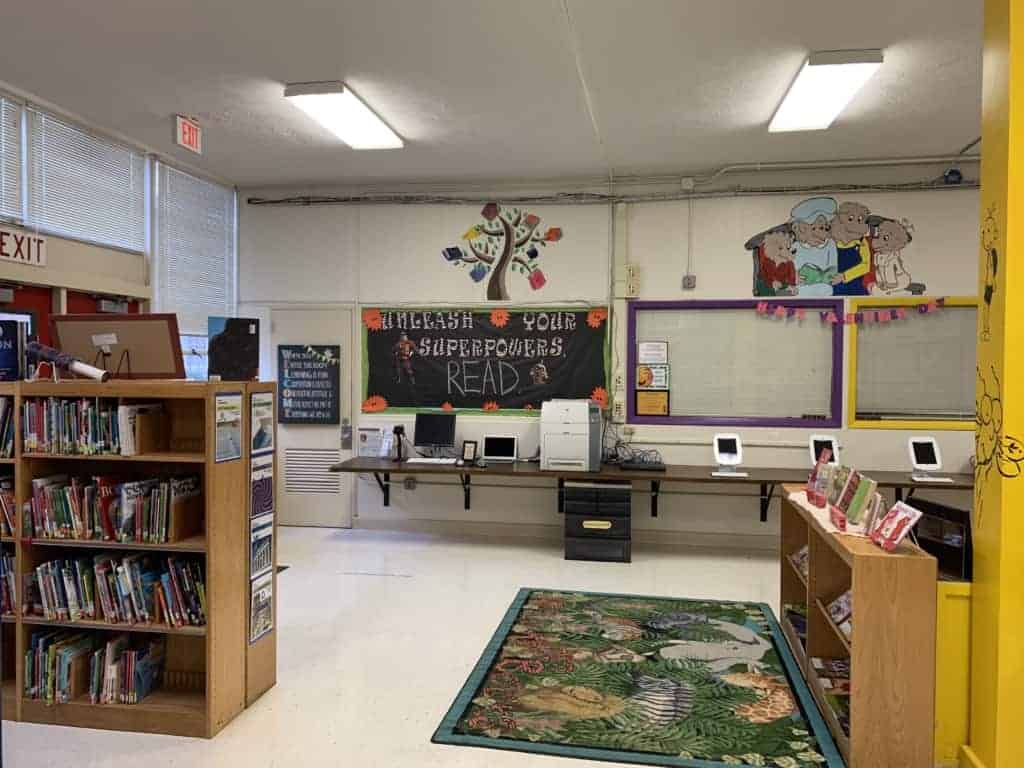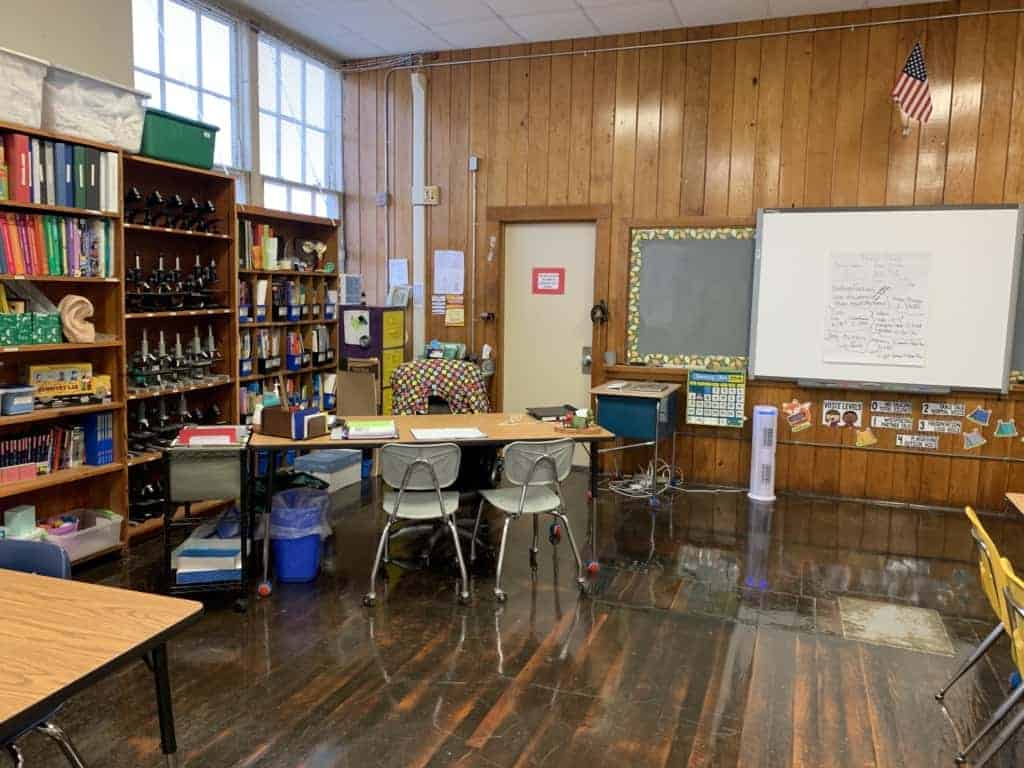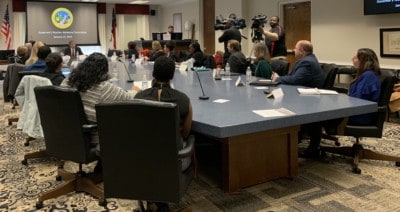Erwin Elementary was built in 1923, and it shows every bit of its age. With state officials scheduled to visit for a roundtable forum to discuss the need for new schools throughout the state, the staff at Erwin worked diligently to clean the old building. That was the update Erwin Mayor Patsy Carson heard when she called the school to check on preparations.
“Stop cleaning!” she exclaimed. “Let them see it like it is.”
Despite the cleaning, the message — that Erwin needs help building new schools — landed squarely. Both Rep. Linda Johnson, R-Cabarrus, and Rep. Craig Horn, R-Union, felt nostalgia for their elementary school days upon seeing the timeworn buildings.
“That was 1949 when I first went to school, [the building] looked just like this one,” Horn said. “But this is 2019 — by the time we get the schools built, it’s going to be 2021, 2022. The kids in our schools today aren’t like us. And, in fact, as I look around and see a few other gray hairs, the kids aren’t like our kids. And, in some cases, if you’re as old as I am, the kids don’t even look the same as your grandkids.
“We have an obligation to ourselves, our kids, and the future of this state, to provide facilities that answer the needs of the 21st Century and prepare them for 21st Century jobs.”
Johnson and Horn were part of a group led by House Speaker Tim Moore, R-Cleveland, and State Superintendent Mark Johnson that visited Harnett County to talk about a school bond proposal that would inject nearly $2 billion into communities to build and renovate schools. They were joined by the three state House members representing Harnett County — Republicans David Lewis, John Sauls and Larry Strickland — county superintendent Aaron Fleming, all five members of the county board of education, two members of the board of commissioners, and Carson.
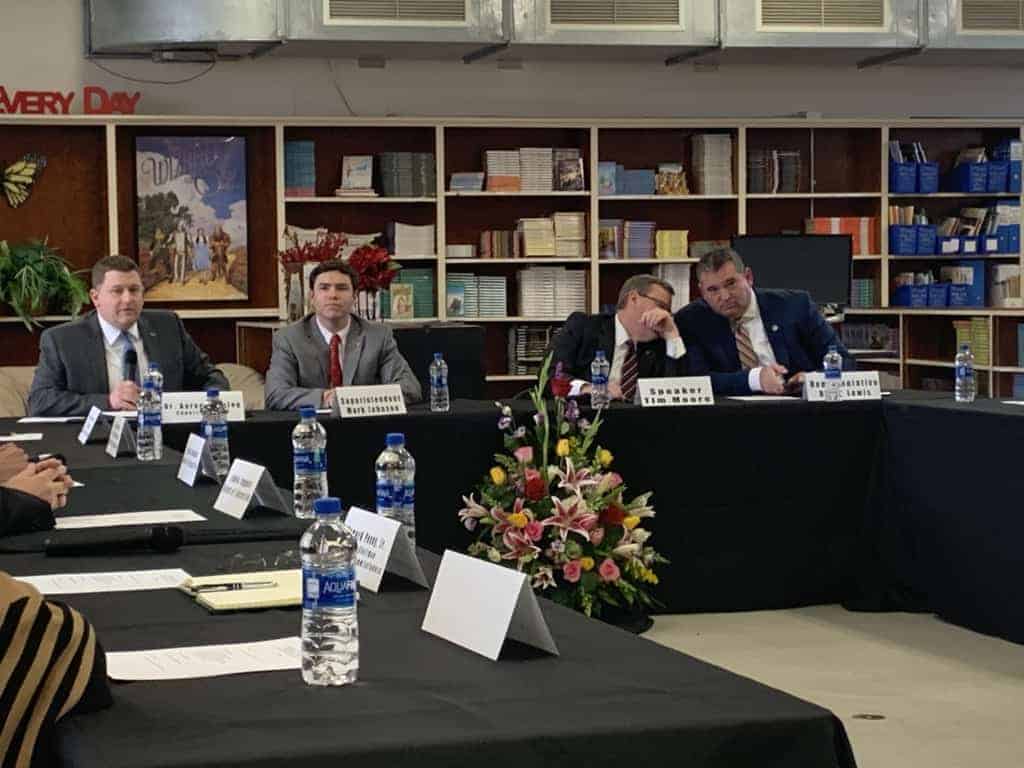
Bond back on the table
North Carolina has not had a public school buildings bond since 1996. In 2016, the Department of Public Instruction conducted a facility needs survey and determined that there was $8.1 billion in school capital needs across the state over the next five years. That number was broken down among three tiers of counties, with 40 “Tier 1” counties needing $1.2 billion, 40 “Tier 2” counties needing $3.05 billion, and 20 “Tier 3” counties needing $3.8 billion.
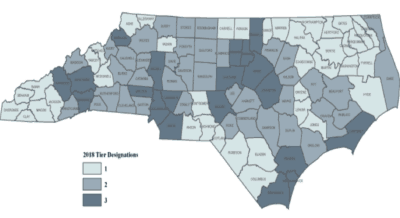
Under North Carolina law, local governments are responsible for funding school capital needs — but many counties cannot foot the bill. In response, Johnson and Horn, who sat side-by-side at Thursday’s forum, joined colleagues in the House in sponsoring a $1.9 billion school bond referendum in April 2017. Despite some bipartisan support and teacher protests calling for the bond to be put on last November’s ballot, the bill never made it out of committee.
The new bill, spearheaded by Moore, is identical in total dollars, but will vary from last session’s version in allocation. Among the differences, there will be a greater focus on getting money to rural, low-income counties. The bill will also allow for schools to use bond money to pay off debt and for school safety. One example given was adding the words “lock” and “tech” to the current proposal to open up funding to make entrances more secure at existing schools.
“I’m never glad that a school bond doesn’t pass because the needs are so great,” Johnson said, referring to her version in 2017. “But we needed to refine this bill. And this, I believe, is the best process for us to be able to make sure that when this bond passes, that it meets the needs of the people.”
Moore added that the timing was not right when the bill was last proposed, primarily because they did not know what the debt capacity was and there was uncertainty regarding the fiscal impact of Hurricane Matthew. Since that time, of course, Hurricane Florence made landfall and unleashed record amounts of damage. While the total costs from Florence are still being tallied, the disproportionate impact to older school buildings underscored the need to modernize schools across the state.
If it passes the legislature in 2019, this school bond referendum would be on the ballot for the 2020 primaries. Most of the money, $1.5 billion, would go toward building new K-12 schools, with about $200 million allocated for the UNC System and $200 million allocated for the community college system.
Moore said legislators are still working to ascertain the debt capacity, and that he will work with the state treasurer’s office to determine whether even more funds could be provided for in the bill. If more funds do open up, he said it is likely these will go into the pot for the K-12 improvements — with a focus on getting money to rural communities.
“I think it’s important that as we do this tour, and as we start this tour, that we do so in a school in a rural part of the state,” Moore said. “A part of our state that has a lot of opportunity, but also has some challenges. I will tell you that the issues facing a town like Erwin are very similar to the issues facing a town like Rutherfordton in the Western part of the state. There are many more things in common than things that are different. One of the things with this bond proposal is to make sure that as we grow as a state … that rural infrastructure is not left behind. That rural North Carolina gets its fair share of this school construction money.”
The Erwin Example
Erwin Elementary painted a compelling backdrop for the bond proposal. It was built 95 years ago as a high school. In the nearly one century which has passed, it became a middle school and then elementary school. Along the way, three buildings were added with the last of the new construction in 1957.
A close look at the buildings reveal peeling paint and age stains on the brick. Cracks traverse the wooden roof of the breezeway and ceilings have been repaired from when they started to fall years ago. Testing done in 2016 showed elevated levels of lead in the water attributed to the age of the pipes. The school boasts hardwood floors throughout, but they groan under the weight of crowds in the halls. Radiators are fastened to the walls and outside of each building you still see a fire escape, an outdated emergency feature long-since abandoned for interior fire-proof staircases in newer construction.
Indeed, in the weeks leading up to the current school year, the awning on the east side of the building crumbled to the ground and a ceiling fan in the art classroom fell to floor.
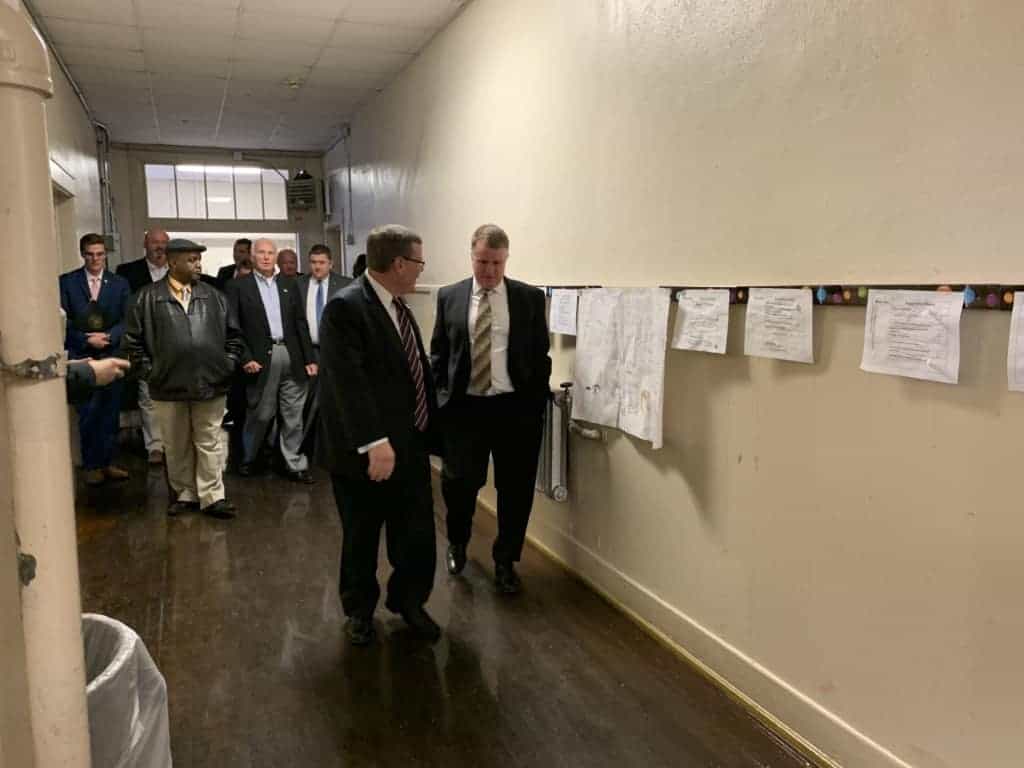
“Erwin School may be old, but it is loved,” Harnett County school board Chairman Jason Lemons said. “In fact, in this community, this is a beloved building, it’s a beloved institution. Good history, great memories, and many, many years of service. But like all of our antiquities, at some point we really do have to put them to another use. I think today’s meeting is going to show that this building has been a fantastic beacon for education, but it is time for us to go ahead and take the next step in the Erwin community.”
Layne Massengill teaches language arts at Coats-Erwin Middle School in Coats. There, she works in a more modernized environment. But she’s from Erwin, and she came to observe the roundtable forum on Thursday because she wants to see Erwin schools get an update she believes they deserve. She remembers when the textile mill — from which the town got its name — was spinning and weaving cotton and Erwin’s economy was thriving. She recalls how Erwin’s tax dollars went to neighboring towns to help them build their new schools.
“We just want our return,” she said. And she’s hopeful that will happen soon. “To me, it seems we have more people willing to listen,” she said. “Before, it was always just pushed aside.”
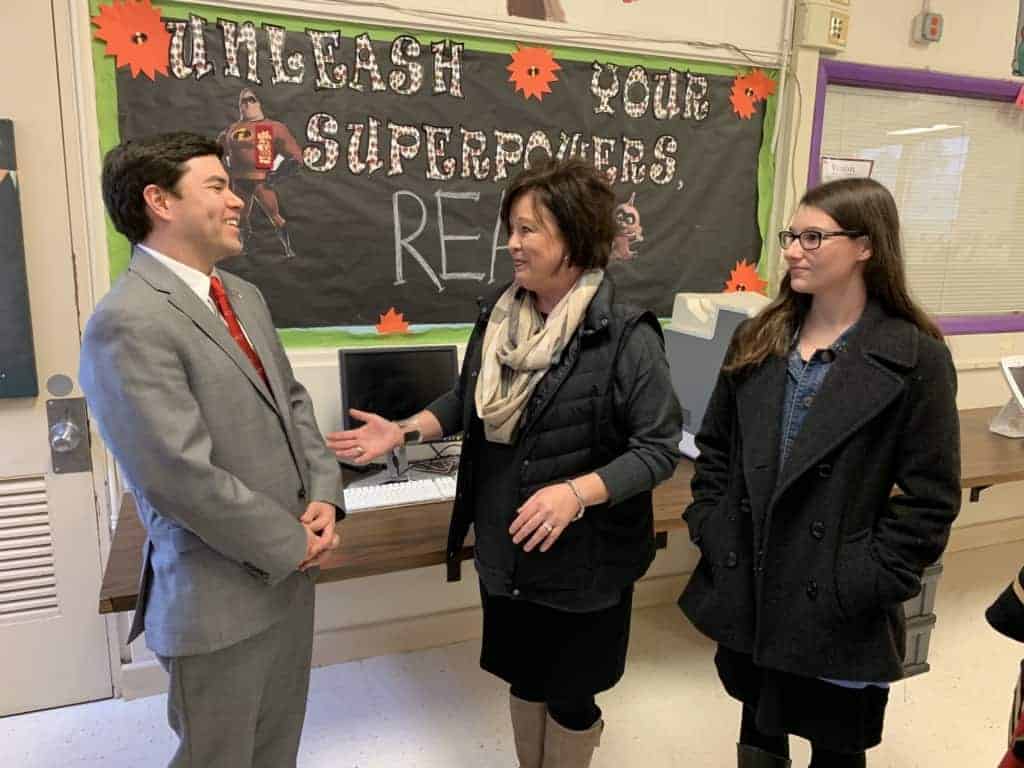
Starting in Harnett
One of the reasons the “school bond tour” began in Harnett County, Moore said, is because its legislators “are very passionate about public education” and “making sure that the school facilities are the best they can be.” He noted that the trio were among the first to ask how they could help when Moore announced proposal of the bond.
But perhaps more importantly is the sheer need. Harnett County schools are aging and, as the county grows, school board officials believe they are three schools behind in keeping up with the student population. According to county commissioners, Harnett County is the eighth-fastest growing county in the state and 95th-fastest growing county in the country.
“Growth brings challenges,” Strickland said. “… You have different challenges with the older buildings. But moving out of the older structures brings such a quality of education back into the classrooms and those quality teachers get excited and the community gets excited. Every child deserves a good-quality education.”
According to estimates by the General Assembly’s Program Evaluation Division, it would take more than $239 million to address Harnett County’s future capital facility needs. It would take $23 million to replace Erwin Elementary, alone.
“We know that nearly $240 million in school buildings cannot happen within the current Harnett County tax base,” Fleming said. “The need for a state-wide school construction bond is witnessed here in Harnett County — but it’s felt all across North Carolina.”
County officials acknowledge that the bond will cost tax-payers, but they insist that it will return more than it costs. Improving schools, they say, means improving economic development because corporations tend to gravitate to areas with good schools and educated citizens.
“We don’t need to be behind,” School Board Vice Chairman Don Godfrey said. “We need to catch up and get ahead.”
This is a sentiment legislators are hearing from a number of rural counties, and why bill proponents are taking the school bond tour through rural counties first. Next stop: Columbus County, which Speaker Moore said he would visit sometime next week.
“We’re going to go around the state — from east to west, north to south, urban and rural, to make sure we are getting the word out to the community so folks can hear about this,” he said.
And as they tour, the focus is less on public relations and more on public information — both providing and receiving.
“Sometimes people think that we have things like this, this forum, to just make people aware,” Johnson said. “But actually we came here today to listen. … What we’re trying to do by being here today is to figure out exactly what the problems are across the state. “



